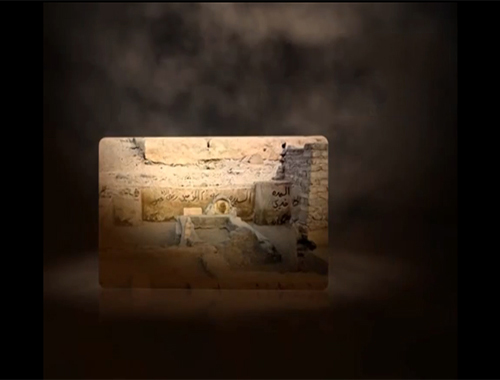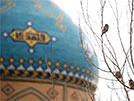Chapter Two: Outcome of Subnission
- Details
- Hits: 3866
Chapter Two: Outcome of Subnission
The last stage on the path of guidance is submission before the Beneficent God and by taking this step man reaches to the position of 'being guided' and the course of divine general guidance. The gift of this stage is perceiving the spirit of faith of the Compassionate God. Like the innate Ma'refat, the spirit of faith too is a gift and bounty from the Merciful God with the difference that the basis of innate Ma'refat is common (for all) whereas the spirit of faith is earmarked only for those who submit and bring faith. While mentioning the specifications of faith, we shall describe and make clear the above matter.
In divine works, the matter of faith and its issues have been mooted from various angles. Here we shall, at first explain the various meanings of faith and then see the divine faith from two dimensions of 'believers faith' which is the act of man and 'spirit of faith' which is the creation of God. While mentioning some of their specialities we shall also briefly compare them with the viewpoints of Greek philosophers.
(1) Meaning of Faith
In the generous Quran and noble traditions, the term of 'faith' is applied to various meanings. Among the various meanings we may mention the following:
“Confession by tongue”[44], “confirmation by heart”[45], “divine duties”[46], “acting upon the duties and abstaining from cardinal sins”[47] “performing the obligation and leaving the absolute sins”[48] and performing the obligatory and recommended acts and abstaining from the forbidden and abominable acts (even permissible ['Mubah'] acts).[49]
The meaning which has been emphasized more than all other meanings and which also matches with the actual meaning of divine faith is the meaning of “belief of heart accompanied with confession by tongue and action by the limbs” and it is this very meaning that has been utilized in the meaning of apparent submission vis-a-vis 'Islam'[50] This meaning has been set forth by the Holy Imams (A.S.) as against the two widespread views.
'Murja'a' reckoned the apparent confession of the Ka'bites to be sufficient for Islam and faith and the 'Khawarij' believed that acting upon the obligatory (acts) and abstainence from the cardinal sins were necessary in Islam and faith. Meanwhile the true inheritors of the religion of God and the true exegetists of the Generous Quran have, by virtue of Quran and Sunnat of Holy Prophet (S.A.W.) expressed this fact that apparent confession is sufficient for (bringing) Islam. However for faith only the condition is necessary and its adequate condition is apparent confession and heartly belief along with divine action. Thus faith by the above meaning will be synonymous with heartly submission and its requisites i.e. submission by tongue and deeds.
In Islamic sources, faith by the above meaning has been associated with another matter by the name of “spirit of faith.” That is to say, in proportion to a believers faith, God helps and provides relief to his heart, makes the light, tranquility, expansion, piety, brightness and certitude to glimmer in his heart and existence and makes a believer fortunate with a lustrous and spiritual reality called “spirit of faith.” In this section, more than anything else these two topics i.e. believers faith and spirit of faith will be emphasized. One of them is the act of man while the other the make of God. One takes shape on the basis of spiritual position of a person and his freewill while the other is imparted by God.
(2) Spirit of Faith is the Make of God
In the tradition it has come that:
(*) (Holy Quran: Mujadala: 22) (*) (Usul-e-Kafi; vol. 2; Pg. 15)
About this verse, that “God has put down faith in their hearts” I asked Imam Sadiq (A.S.) whether the believers are having any role in the putting down of faith to which Imam (A.S.) replied 'No'.
The spirit of faith is the substantiation and support of God towards His faithful slaves.
(*) (Holy Quran: Mujadala: 22, Usul-e-Kafi; vol. 2; Pg. 15; tradition 1 & 5, Behar al-Anwar; vol. 69; Pg. 190; tradition 5; Pg. 194-200 and vol. 68; Pg. 274)
The spirit of faith is a repose and a pacification, which is revealed from God upon the heart of a believer.
(*) (Holy Quran: Fath: 4, Usul-e-Kafi; vol. 2; Pg. 15; tradition 1, 3 & 5)
The spirit of faith is the same divine piety, which is attached and accompanied with the believers.
(*) (Holy Quran: Fath: 26, Behar al-Anwar; vol. 69; Pg. 200; tradition 21)
At times when believer returns back and revolts against the basis and foundation of faith (submission), the spirit will be taken away from him.
(*) (Behar al-Anwar; vol. 69; Pg. 178; Similarly, Pg. 19; tradition 4, 5 and Pg. 198; tradition 16)
The line of demarcation between a believer and non-believer is the spirit of faith.[51] Just as the line of demarcation between Infallible and Non-Infallible is the Holy Spirit ('Rooh al-Qodos'). (Holy Quran: Mujadala: 22, Baqarah: 253, Behar al-Anwar; vol. 69; Pg. 179; tradition 3 and Pg. 191)
(3) Faith and Heart
Divine faith (faith of a believer and spirit of faith) is an affair related to the heart and in the divine works, man's faith has been remembered under such names as
“Object in the heart” (Behar al-Anwar; vol. 68; Pg. 282),
“Submission by heart” (Behar al-Anwar; vol. 68; Pg. 265),
“An agreement in heart and by heart” (Behar al-Anwar; vol. 68; Pg. 256, 291 and vol. 9; Pg. 65, 69),
“Confirmation by heart” (Behar al-Anwar; vol. 68; Pg. 273 and vol. 69; Pg. 68; tradition 21),
“Whatever is steadfast in the heart” (Behar al-Anwar; vol. 68; Pg. 251),
“Whatever is pure in the heart” (Behar al-Anwar; vol. 69; Pg. 72),
“Faith in heart and by heart” (Behar al-Anwar; vol. 69; Pg. 72) and
“White spots in heart” (Behar al-Anwar; vol. 69; Pg. 196). The spirit of faith has been remembered under such titles as
“A making in the heart” (Behar al-Anwar; vol. 68; Pg. 273, 274),
“Verification by heart” (Behar al-Anwar; vol. 68; Pg. 273, 274) and
“An inscription in the heart” (Holy Quran: Mujadala: 22, Behar al-Anwar; vol. 69; Pg. 200; tradition 22).
Such definitions show that faith is a matter related to the heart and is not an affair related to the tongue and not a notion and confirmation related to the mind. If man, fully submits himself before God, then God too will directly confirm his heart and soul without the means of understandings and imaginations.
(4) Faith and Action
After man submits himself before God and admits Him by heart, then in proportion to his faith, a light is imparted to him which its essential condition is religious conduct and worship of God.
Among the characteristics of Shi'ism is the view of 'faith' and 'Islam'. As against the Khawarij and Murjaans, the Shias have reckoned religious deeds to be of material in faith and believe it to be a condition for faith. On the other hand they do not consider worship and deeds to be of material in Islam in its apparent form.
This view (i.e. Shia view) has been drafted on the basis of Quran and tradition.[52]
Many traditions substantiate this matter that a believing person does not commit a sin and if at all it is seen that a believer commits a sin it should be then admitted that God has taken away the spirit of faith at the time of performance of sin and even much before that. Moreover it is only through repentance and penitence that the previous brightness and purity will be returned back to him.
The above point is yet another difference between divine theology and philosophical theology meaning that the result of notion and affirmation of God is eventually a rational (mental) confirmation of the existence of God. Undoubtedly, the necessary relation between 'mental confirmation' and a 'spiritual deed' is absurd even though every mental confirmation is usually proportionate to a special deed. Basically, from the viewpoint of philosophy there does not exist any kind of necessary and logical relation between mental confirmation and its corresponding deed. Therefore at the time of leaving that deed, no harm comes to the mental dole and from here the separation between knowledge and deed takes place in the form of justified views.
However the outcome of divine stages of theology is the heartly contract and finally the receipt of spirit of faith which will be followed by conduct commensurate with faith i.e. there exists a necessary and essential relation between faith and worship. In spite of this, freewill does not lose its sovereignty in all the stages. The secret of this talk is hidden in the rudiments of faith.
In as much as after submission and as per its intensity man enjoys the spirit of faith, the same submission (after faith too) which has taken shape on the basis of free-will, manifests into action along with divine stipulation and confirmation. In reality at the time of disobedience and sins too, a person gives up by his own free-will the basis of faith (which is the very submission) and finally the divine confirmation is taken away from him and the unjust and unworthy deed is manifested by him.
In this way, sins bring harm to the essence of faith because of destroying its basis and in this regard many tradition have been narrated. Just as it was formerly said, it has come in these traditions that at the time of disobedience and transgression, the spirit of faith is taken away from the sinful person.[53]
(5) Faith and its Degrees
The submission of people before God is not of one level because, commensurate with their spiritual capability and freewill they submit themselves before God with special degrees. As such, the faith of the people possesses different ranks and degrees and with regards to divine confirmation and spirit of faith too, they enjoy a special degree. It is for this reason that the devoutness of the believers and their religious conduct are diverse.
On this basis, the traditions which have explained various meanings for faith not only have no contradictions among each other but reveal the different levels of faith.
The point which is necessary to be said over here is this that a person does not constantly remain fixed in the same level of faith. Rather he fluctuates in various degrees. The secret of this matter is that the basis of faith and the spirit of piety is the submission of man on the basis of free-will and created freedom. After submission too, this freedom keeps its power and a person can either turn around from submission or strengthen it and ascend to a higher level of faith.
(*)
“We confirm the spirit of faith by obedience of God”. (Behar al-Anwar; vol. 69; Pg. 194)
We should say that many traditions have come regarding the levels of faith and its condition and causes. For the sake of brevity, we shall content ourselves only by the mentioning some of their references.[54]
Gist of the Discussion
“The Greek philosophical theology” and “the divine theology possess different basic facts and results. In this book, while a comparison was made between these two schools of thought, the diverse basic facts and results were discussed and in each of the cases adequate reasoning were presented. Over here we shall refer only to some of the basic fundamentals of these two schools of thought.”
(A) Fundamentals of Greek Philosophical Theology
(1) The notion of God and His affirmation takes shape in the mould of one philosophical arrangement and system. As a rule, this kind of theology is brought into existence when philosophical reflections about the world and existence have developed to a sufficient level and the philosophical schools of thought are on the verge of growth and development. Since the world without God is not capable of philosophical explanation therefore the notion of God, finds its place in such kind of school commensurate with the philosophical system.
(2) This kind of theology is a creatable matter in human culture and civilization and in Greece it begins in a deficient state with Anaximanas, Kasnufanas, Heraculitis and then Anaxagoras and finds its perfection in Plato and Aristotle.
(3) The notion of God from other sciences is recent because it takes shape on the basis of knowledge of existence and theology in general.
(4) Understanding such kind of theology is complicated and difficult matter because from the view-point of notion it depends on the preceding sciences and from the view point of confirmation of special logic which a philosopher presents, it is having a stoppage. On the other hand, considering that the more we advance towards abstraction the more we remain far from sensation and the more difficult becomes the recognition, therefore the recognition of God who is an absolute abstract, is the most difficult of all the recognition. Plato and Aristotle have emphasized this matter.
(5) This kind of theology is specifically for some special people who possess the required conditions. These conditions have been specified by Plato.
(6) Recognition of God is the act of man and by his mind a person can imagine God.
(7) The basis of God's recognition is a rational (mental) imagination of God and this imagination and notion too is Universal because other than the Universals, the intellect does not recognize correctly and accurately any other thing. Therefore, in order to prove monotheism we are in need of another proof.
(8) Recognition of God reaches perfection when Universal imagination is made ready and is affirmed by philosophical method i.e. the relation of God with external existence is proved.
(9) There does not exist any relation between ethics and recognition of God and moral virtues and vices are having no effect in the recognition of God. Incidentally man's freewill and his influence in the recognition of God and basically in every kind of recognition and conduct is not capable of explanation and clarification.
(10) Any special deed is not an essential condition for recognizing God and there does not exist a relation between mental confirmation and conduct.
(B) Fundamentals of Divine Theology
(1) Recognition of God is ascertained without any kind of philosophical arrangement and system.
(2) Recognition of God is ancient and Ma'refat (gnosis) of His Holy Essence has been accompanying man's soul right from his birth and rather before his birth.
(3) Recognition of God is having no stoppage upon different and rudimentary sciences.
(4) Recognition of God is not a matter of mental complication and so is not peculiar to some specific people. It involves all the common people.
(5) The focal point of God's Ma'refat is the heart of man and man perceives God with his soul and existence without the means of mental understandings.
(6) Ma'refat (gnosis) of God is the act and make of God. It is as He has defined Himself and this definition and Ma'refat (gnosis) is outside the scope of human sciences.
(7) In divine definition (of God), man is heedful of an external and personal God and not a Universal God. Thus the monotheism of God is not separate from His Ma'refat (gnosis).
(8) Instead of 'proof', discussion is about 'reminding'.
(9) There prevails a deep relation between man's freewill and morals on the one hand and the Ma'refat (gnosis) of God and faith in Him on the other hand.
(10) The essential condition of recognition of God and divine faith is a specific act and there exist a firm relation between faith and action.
THE END
--------------------------------------------------------------------------------
Notes:
[18] 18-The matter of past worlds is not peculiar to the Imamieh sect and Ahle Sunnat too have narrated numerous traditions in this regard in their reliable hooks. For example Suyuti in the hook of Durrul Mansoor narrates under verse 172 of chapter A’raf of Holy Quran only the tradition proving the precedence of the past worlds. These traditions have been narrated from Holy Prophet (S.A.W.), some of his companions, disciples of the companions and famous and reliable scholars of Ahle sunnat (Jalaluddin suytui, Durrul Mansoor; Daarul-Fiqh-Beirut; vol. 3; Pg. 597 to 607).
[19] 19-Book of Arshia.
[20] 20-A- Behar al-Anwar, Darrul Ketab al Islamiyeh; vol. 3 chapter 11 (&Al-ta’reef fil Meesaaq); Pg. 276; tradition no. 7, 10, 11, 16, 17, 20 Totally 6 traditions. Of course the other traditions of this chapter too prove the context. B- Behar al-Anwar vol. 5; chapter 10 (Teenato wal Meesaq) Pg. 225; Tradition no(s): 5, 7, 8, 9, 12, 14, 15, 25, 26, 27, 32, 33, 34, 35, 39, 41, 42, 43, 44, 47, 48, 49, 51, 52, 53, 55, 56, 57, 58, 59, 60, 61, 62, 63, 64, 65, 66, 67. Total 38 traditions. C- Behar al-Anwar; vol. 15; chapter 1 (Bada’o khalqahu wa maa yata’allaqo bezalek) from tradition 3 to 48 apart form 30, 31, 32, 33, 35, 37, 38. Total 39 traditions. D- Behar al-Anwar; vol. 25; chapter 1 (Khalaqahum wa teenatahum Wa arwaahahum alaihe as-salaam) traditions no(s): 2, 3, 4, 5, 7, 9, 19, 27, 28, 29, 30, 31, 34, 35, 36, 37, 38, 39, 40, 41, 42, 43, 44, 45 Total: 24 traditions. Of course other traditions too prove the point. E- Behar al-anwar; vol. 26; chapter 7; Pg. 117 (Ennahum (alaihessalaam) ya’refoon annaas) traditions 1, 4, 5, 6, 7, 9, 38. Similarly chapter 5; Pg. 108; tradition no. 13 and Pg. 320, tradition no. 2; Total: 9 tradition. F- Behar al-anwar; vol. 60; chapter 41 (Bada’o khalq al-ensaan) Pg. 317; Tradition 28, 30, 31 (Pg. 344), 31 (Pg. 346), 40, 58, 81, 106. Total 8 traditions. G- Behar al-Anwar; vol. 61; chapter 43. (Fi khalqel arwaah qablal Ejsaad) Pg. 131 from traditions 1 to 19, similarly Pg. 41 tradition 12 and Pg. 79, tradition 12. Total 21 traditions H- Behar al-anwar; vol. 99; chapter 40. (Fazl ul Hajere Wa ellato estelameh) Pg. 216, traditions 1, 2, 4, 5, 6, 9, 11, 19, 29 and as per the context of such traditions we have traditions 3, 7, 12, 22, 25, 28. Total 15 traditions.
[21] 21-Behar al-Anwar; vol. 6; Pg. 179. Apparently the world between soul and body has been the world of substance (Teenat) or the world of pre-existence (Alam-e-zar) because these two worlds are after the world of soul and before the world of bodies.
[22] 22-For example: Tauheed of Sadooq chapter of Names of the Exalted God. From Pg. 185 to 223; Similarly Pg. 76, 65, 70, 98, 99 etc.
[23] 23-In commentary of the chapter ‘Haadi Ashar’ it has come as such: (*) Miqdad ibn Abdulla Sayuri; An’naafe Yaum ul Hashr& Pg. 18.
[24] 24-For example Taghabun: 11 and Baqarah: l-2.
[25] 25-Baqarah: 164, Yunus: 6, Ra’ad: 2 & 3, Nahl: 11, 12, 13, 14, 16, 65-79, Bani Israel; 66, Taha; 54, Anbiya: 32, Shura: 8, Rum: 20-26, 46, Luqman: 31, Mu’men: 81. Sajdah: 53, Mu’min: 13, Furqan: 62, Zaariyaat: 49-55, Waqe’aa: 73, Yunus: 3, Ghasheya: 17-21, A’ala: 1-10.
[26] 26-First Section
[27] 27-(*) (Behar al-Anwar; vol. 1; Pg. 225). From the clear evidences of this tradition is ‘Ma’refatullah’ just as guidance by way of precedance is true to the Ma’refat of God. Another point which can be seen m this tradition it that preferent of servitude is for knowledge and guidance. This matter will be discussed in the “Third Method”.
[28] 28-First and Second Section.
[29] 29-The role of contemplation and rationalization and their importance in divine Ma’aref is not something which can be denied. But it does not mean that intellect in all the affairs is capable of achieving the truth independently and without the help of inspiration. Basically intellect (reason) cannot reach to the boundaries of the unseen and whatever is said about it is nothing more than mere conjecture and supposition. Among the unseens is the matter of notion of Essence, Attributes and Actions of Exalted God, which was discussed, in the first stage. If we pass over from this Set of Ma’aref then contemplation and thought with the aid of inspiration can traverse stages of recognition and Ma’refat. Among them we may mention proof of existence of God, Monotheism (Tauheed), Prophethood, Imamat etc. Intellect is inaccessible to the injunctions but for discovering the aim of legislator and more important than that examining the ways for executing the injunctions, contemplation plays an important role.
[30] 30-(*
[31] 31-Baqareh: l8 and 171, A’raf: 64, Naml: 66 and 81, Rum: 53, Fusselat: 17, Mohammad: 23.
[32] 32-At the time when Hazrat Isa (A.S.) was in Jerusalem having an argument with the obstinate army they told him: “Show us your God so that we become Jews.” Then Isa at that moment replied: “If you were having vision I would have showed Him any time, but since you are blind I am unable to show Him to you.” (Bible of Barnaba; Chapter 152; Pg. 310
[33] 33-Behar al-Anwar; vol. 2; Pg. 6 and 125 (*) In continuation of the tradition, while explaining the above matter, it has made clear one of the disputation of Quran about the matter of the Day of Judgement and then says: (*
[34] 34-Basically in the Ma’aaref of Holy Book and traditions where there is way for acquiring the lofty Ma’aref , instead of using the concepts of son, discussion, disputation and contention we find such terms as ‘Zekr’ (mentioning), ‘Mozakereh’ (conversation) and ‘Tazakkur’ (reminding) etc etc. which shows the special method of the Prophets in achieving the described reality. (Behar al-Anwar; vol. 1; Pg. 198 to 206 chapter of ‘Mozakeratul Elm’; traditions 6, 8, 11, 17, 18, 21 , 26, 36, 37, and Usul-e-Kafi; vol. 2; Pg. 186-188 chapter of ‘Tazakerul Akhawan’).
[35] 35-Behar al-Anwar; vol. 2; chapter 17; Pg. 124 61 traditions have been narrated with regards to this matter (traditions 3 to 14, 16, 19, 20, 22 to 24, 27, 30 to 32, 47 to 56, 58, 59, 61.
[36] 36-Dr. Mohsin Jehangiri: “The appearance of theology and its position among the sciences” Pg. 80-81. In this research article, verses in this regard are mentioned and historical evidences too are produced.
[37] 37-Same Source.
[38] 38-Sharafuddin Dawud Qaisari - Rasa’el Qaisari - resalat-e-tawheed wa Nabuwwat wal Vilayat, chapter one Pg. 24. The scholar Laahiji, in compiling the matter says commonly: “If the absolute enchanted one is intoxicated or has become exterminated then there remains no religious duties for him, and if he is from the perfect ones (which was referred to in the third section) then even though from the view-point of un-official guidance he is charged with the injunctions of the Shariat and the commandments and prohibitions are not removed from him yet, he is no more in need of following any means for his perfection because he has reached to the extreme end of his perfection: “Commentary of Gulistan-e-Raaz”
[39] 39-The same question and want of its reply is the very one of the means of appearance of the two views of ‘Efraat wa Tafreet’ (going to two extremes) i.e. compulsion and freedom in the Theological centers of the Muslims. Of course, compulsion and freedom is having an ancient record among the human gnositcs and right from ancient times has drawn man’s thoughts towards it. However the apparent two-foldness of some of the verses of Quran especially in the matter of guidance on the one hand and the non-presentation of a plan comprehensive in this regard and the lack of separation between ‘divine guidance’ and ‘being guided’ on the other hand has not been ineffective in giving shape and intensifying the two schools of ‘Qadari’ (Free will) and ‘Jabri’ (determinists).
[40] 40-Driving Force: (*) By Driving Force is meant everything, which impels man towards his goal. We have selected this term for the reason that in it, there does not exist a causal coercion meaning. In the traditions too, this term has been used in this same meaning. (*) Injustice and encroachment drives man towards destruction. Commentary of Ibn-Mitham on hundred sayings of Amir ul Mo’meneen Ali (A.S.) Pg. 129.
[41] 41-Holy Quran: Baqarah: 89, l46, 2l3, 253, 254.
[42] 42-More discordant is that some are still intending to collect the views of Greek philosophers. If this method is having no objection for the ancients it is unforgivable for the modern ones. The view of “philosophical Unity” (of God) which was having a splended past is now having no attraction for the researchers of history of philosophy. Nowadays the works of Plato and Aristotle have been translated into various languages and their contradictions and differences have become clear and obvious for all. Aristotle in ‘Metaphysics’ has himself with decisiveness great vigor made an inroad in the belief of his predecessors like his master Plato and Socrates and criticizes their views severely which one of the cases is the above saying. Those who, for various reasons engage in explaining and collecting the opinions of the Greek sages, unwillingly impart this point that the philosopher have not understood their own and others views and so they criticize each other.
[43] 43-For example the same above reference Pg. 60 to 80.
[44] 44-For example: (*) Holy Quran: Nisa: 136 The first faith gives the meaning of confession and the second faith gives the meaning of heartly confirmation and the meaning of verse is as such: “O’ those who have confessed to the rightfulness of the religion of God, confirm it too by the heart. Similarly, Behar al-Anwar; vol. 68; Pg. 273. In that tradition another verse too has been mentioned in this regard.
[45] 45-For example: (*) Holy Quran: Nisa:136 The first faith gives the meaning of confession and the second faith gives the meaning of heartly confirmation and the meaning of verse is as such: “O those who have confessed to the rightfulness of the religion of God, confirm it too by the heart.” Similarly, Behar al-Anwar; vol. 68; Pg. 273. In that tradition another verse too has been mentioned in this regard.
[46] 46-For example: Holy Quran: Baqarah: 143 (*) “ After the change in the direction of ‘Qibla’ the Muslims asked Holy Prophet (S.A.W.) whether their prayer in the direction of ‘Baitul Muqaddas’ had become void or not? In reply, the afore-said verse was revealed. Behar al-Anwar; vol. 68; Pg. 274 and vol. 69; Pg. 77, 78.
[47] 47-For example: Behar al-Anwar; vol. 68; Pg. 262 last line; Pg. 270; tradition 26 and Pg. 277, 299 tradition 27 and vol. 69; Pg. 73.
[48] 48-For example: Behar al-Anwar; vol. 68; Pg. 256, 259, 296 and vol. 69; Pg. 63; tradition 7; Pg. 73; tradition 28.
[49] 49-Traditions which have described the qualities of the believers. For example from Behar al-Anwar; vol. 68; chapter 19 ‘Qualities of Shia’.
[50] 50-Behar al-Anwar; vol. 68; chapter 26 - “Difference between faith and Islam.” In this chapter besides the verses of Quran, 56 traditions have been narrated. Moreover Behar al-Anwar; vol. 69; chapter 30: “Surely action (deed) is part of faith.” Besides verses of Quran 30 traditions have been narrated. Most of these traditions bear witness to the afore-said meanings.
[51] 51-The materialistic philosophers and psychologists in their study of human beings have come to this conclusion that man is a perfect and complicated animal. Of course they cannot be considered as wrong because materialistic thought and belief do not basically possess the power of distinguishing and describing the truth and the sublime it knowledge. At times, they interpret themselves. However, they too should consider us right for considering man to be a divine creature because a believer is assisted by God and moves towards Him. Basically, from divine view-point one cannot have a specific definition for all the human beings because man is in motion and fluctuating between the two extremes of “lowest than an animal” and “highest than an angel”.
[52] 52-For example: Holy Quran: Hujarat:14, Nisa: 136, Behar al-Anwar; vol. 68; chapter 24: “difference between Faith and Islam” Pg. 225 till 309; vol. 69; chapter 30: “Surely action is part of Faith is scattered over the organs” Pg. l8 to 149.
[53] 53-For example: Behar al-Anwar; vol. 69; Pg. 19, 178, 198.
[54] 54-Holy Quran: Anfal: 3, Fath: 5, Bara’at:124, 125; Mujadala: l2, Ahzaab: 22, Baqarah: 261, Ale-Imran: 173, Waqe’ah: 8-l0, Muddaair: 31, and Behar al-Anwar; vol. 69; chapter 32 - “Levels of Faith and realities Pg. 154 and chapter 33 - “Tranquility and spirit of Faith and its excesses and deficiencies Pg. 175.











